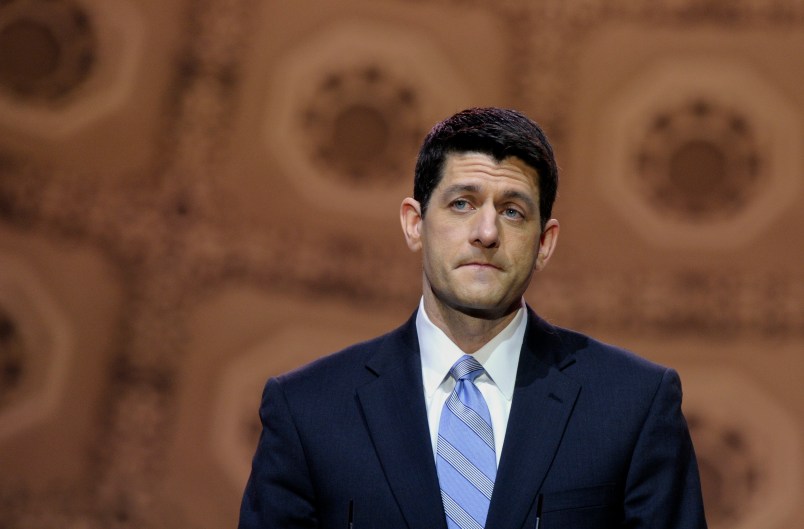Last week at CPAC gave Rep. Paul Ryan yet another opportunity to play his favorite game, “Paul Ryan Cares About Poverty.” This one went even worse than usual.
Ryan told a story in his speech about a boy who was sad that he got the free school lunch, instead of having a bag lunch from his parents, and blamed “the left” for the boy’s “empty soul.”
There are a lot of problems with Ryan’s story — for instance, it’s not true.
But it also doesn’t make sense on its own terms, because of the sneaky way Ryan hides what’s being argued. It’s a parable with a bait-and-switch.
Paul Ryan sets up the story with a false dilemma — pitting the options as “bag lunch versus free school lunch,” rather than, say, “lunch versus not eating.”
Ryan makes it seem like he wants kids to have a bag lunch and liberals don’t. That’s not actually where the difference comes from. The difference is that, given that the hypothetical boy can’t afford lunch, liberals would rather he have a fallback option, and Ryan thinks it’s better if he doesn’t.
In only one of those cases, the boy winds up eating.
So it’s safer for Paul Ryan to try and make the argument about who’s pro- and anti-“full souls,” because he’s already lost the argument about full stomachs.
I’m sure Paul Ryan really does care about the souls of the poor people. It’s just that his policies don’t do anything else for them. Ryan affects concern for poverty in public to distract from this important point.
Let us count the ways that Ryan’s budget undermines hypothetical boy in his fable:
- Like the rest of his colleagues in the House GOP, Ryan supported substantial cuts to food stamps, and has made no effort to push through an extension of unemployment insurance – two policies that have kept about 5 million people out of poverty, and allowed an awful lot of families the ability to afford to make a bag lunch.
- His budget would cut Medicaid so severely that millions of families would lose their health care access entirely.
- His budget redistributes upward, paying for tax cuts with unspecified but enormous cuts to domestic discretionary budgets.
We do need to have a bigger conversation about jobs and wages in this country. Families shouldn’t be in a position where they can’t afford a school lunch — and it’s not the option of a free lunch that keeps them there, as Paul Ryan wants you to believe. It’s due to a shift in the economy, a long trend of the national income drifting from wages into corporate profits. He isn’t exactly rushing to increase minimum wages, do more to protect collective bargaining, or do any new federal hiring, all of which would actually put more money in the pockets of people who worry about where lunch is coming from.
Ryan’s answer is shredding the social safety net, drawing resources away from poor families, in order to pay for far lower taxes for the wealthiest households and companies who are doing just fine.
All the bait-and-switch in the world, all the attempts to make the argument about souls rather than stomachs, can’t change that.
It’s no wonder that Ryan had to fudge his work in the big report on poverty the House Budget Committee released. “The research he cites doesn’t actually support his assertions … his whole premise about why poverty persists is demonstrably wrong,” Paul Krugman writes.
Ryan is invested deeply in the idea that the wealthy are the ones who deserve it — arguing, by implication, that there must be some moral failing in the poor. On Wednesday, Ryan bemoaned the “tailspin of culture in our inner cities” that keeps people from working, without mentioning the lack of job opportunities. “Your parents need to work harder” is a lousy thing to give kids at lunchtime in lieu of lunch.
Ryan’s policy agenda is to just step away, do less for kids like the one in his story, and assume that will make them better off eventually. The answer to what working-class people are supposed to do is, as usual, a shrug and some half-hearted attempts to appear to care about poverty in general.
Paul Ryan has no answer for that kid other than sincere, heartfelt concern for his soul. It’s not a very filling lunch.
Seth D. Michaels is a freelance writer in Washington, D.C. He’s on Twitter as @sethdmichaels.






